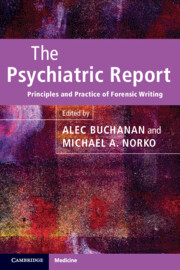Book contents
- The Psychiatric Report
- The Psychiatric Report
- Copyright page
- Dedication
- Contents
- Contributors
- Foreword
- Editors’ preface
- Introduction
- Section 1 Principles of writing
- Section 2 Structure and content
- Section 3 Special issues
- 14 Writing for the US federal courts
- 15 Incorporating psychological testing
- 16 Reasonable medical certainty
- 17 Violence risk assessment
- 18 Malingering
- 19 Psychiatry and ethics in UK criminal sentencing
- Conclusion
- Index
19 - Psychiatry and ethics in UK criminal sentencing
from Section 3 - Special issues
Published online by Cambridge University Press: 07 September 2011
- The Psychiatric Report
- The Psychiatric Report
- Copyright page
- Dedication
- Contents
- Contributors
- Foreword
- Editors’ preface
- Introduction
- Section 1 Principles of writing
- Section 2 Structure and content
- Section 3 Special issues
- 14 Writing for the US federal courts
- 15 Incorporating psychological testing
- 16 Reasonable medical certainty
- 17 Violence risk assessment
- 18 Malingering
- 19 Psychiatry and ethics in UK criminal sentencing
- Conclusion
- Index
Summary
- Type
- Chapter
- Information
- The Psychiatric ReportPrinciples and Practice of Forensic Writing, pp. 254 - 263Publisher: Cambridge University PressPrint publication year: 2011



